Thailand Vipassana Meditation Retreat: What’s It Like?
Have you ever thought about doing a vipassana retreat? More specifically, a vipassana meditation retreat in Thailand? If so, are you curious as to what it’s like?
We did a 10 day silent retreat in Thailand back in 2022 and before we did our Thailand vipassana course, I had a lot of questions. Beyond the fact that I’d be silent for 10 days, I had no idea what to expect. I had a lot of questions.
So if you’re thinking of taking the plunge and curious as to what it’s like, we’ve put this guide together to explain the process, the routine and what you can expect from a vipassana retreat in Thailand.
Thailand Travel Resources
- Start here: Bangkok’s Top 5 Coolest Neighbourhoods
- Best islands: Koh Adang and Koh Tarutao
- Best for adventure: 4-day Chiang Mai Road Trip
- Guidebook: get a copy of Lonely Planet’s Thailand
- Getting there: search for flights to Thailand
- Where to stay: search for guesthouses, hostels and hotels
- How to get around: search for trains and buses
- Rent a car: search for great deals on car rentals
- Travel insurance: get travel insurance for your trip
- Gear: pick up a Steripen for clean water 24/7
- Money: get a Wise money card to save money in Thailand
What is vipassana
Vipassana, which translates to ‘to see things as they really are’, is one of the most ancient forms of meditation. In essence, it’s a form of meditation that practices continued close attention to sensation to allow one to gain deep insight into the self.
Vipassana is taught at 10-day residential courses throughout the world. In these courses, participants follow a prescribed Code of Discipline, learn the basics of the method and practice regularly to experience its beneficial results. These include reduced anxiety and depression, increased concentration and for the very lucky ones, a state of inner peace.
The Code of Discipline includes, amongst others, abstention from eating after midday, using intoxicants, or using high or luxurious beds.
This means that not only are the meditation retreats silent, but you are expected to live simply, without the comforts of the modern world, and quite frankly, uncomfortably. There’s no speaking, reading, using your phones, smoking, drinking alcohol or caffeine or eating any of your own food.
There are many places to take a vipassana retreat. We did ours in southern Thailand, at the Suan Mokkh International Dharma Heritage, which is considered to be one of the best vipassana centres in Thailand.
Suan Mokkh
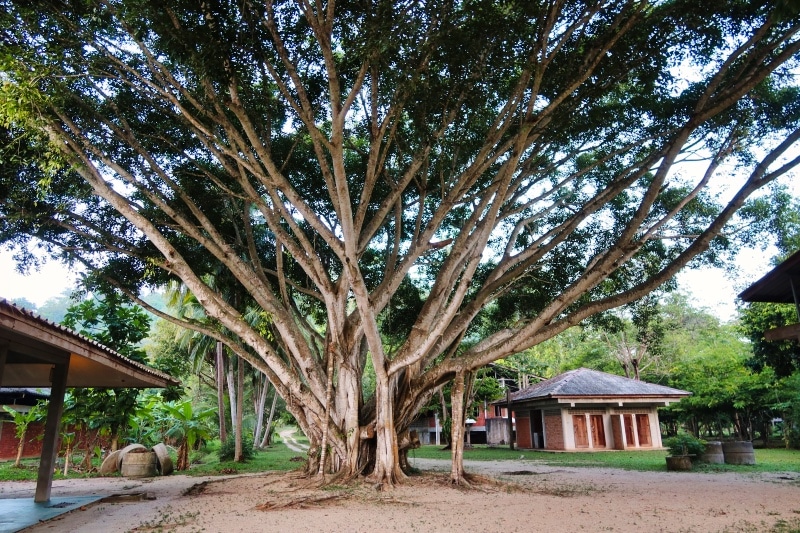
Wat Suan Mokkh is a famous temple in Surat Thani, Thailand. It runs the Suan Mokkh International Dharma Heritage, which leads “10-day” vipassana meditation retreats every month. We say “10-day” because it’s important to know that the course is actually 11 days (we’ll go into that later). These monthly retreats are held from the first day of the month until the eleventh day. The entire course is in English.
The grounds are very beautiful and surrounded by jungle, leading you to feel very cut off from civilisation. There are multiple meditation salas spread out throughout the property, along with a dam.
There is also a small shop with limited hours each day. This is so you can buy a few things you may need throughout the retreat such as mosquito repellant, toilet paper or clothing.
Read next: Koh Tarutao – Thailand’s Best Adventure Island
One of the best features of Suan Mokkh is the two natural hot springs. These are separated by sex (women must wear a sarong, which is supplied on registration day). Men must be fully covered during their walk to and from the hot springs, however, are only required to wear a swimsuit while bathing.
Thailand Vipassana Retreat: Overview of Suan Mokkh
At Suan Mokkh, the meditation retreats are 11 days and you have to commit to the entire time frame.
Why is it actually 11 days and not 10?
Well, you must arrive the day before the retreat starts for registration. However, silence starts that night, so the retreat really starts that day – a day early. Further, the Thailand vipassana retreat ends on the morning of day 11, not day 10. So, this makes it 11 days.
This difference may seem minimal, but when you’re actually undertaking the retreat, trust us, you’ll notice that extra time.
To register for the Thailand vipassana silent retreat, you just have to show up by 3.00 pm on the last day of the month. There is no way to pre-register, email or call and ask questions.
There is a registration fee of 2000 THB per person. This is to cover your food and all living expenses whilst you are there. You can give a supplementary donation at the end, should you wish to.
As detailed above, during the Thailand vipassana silent retreat you will live very simply and be uncomfortable a lot of the time. As they say on their website, “this meditation retreat is not something for fun. It is a serious retreat.” Agreed.
Meditation Retreat Registration Day
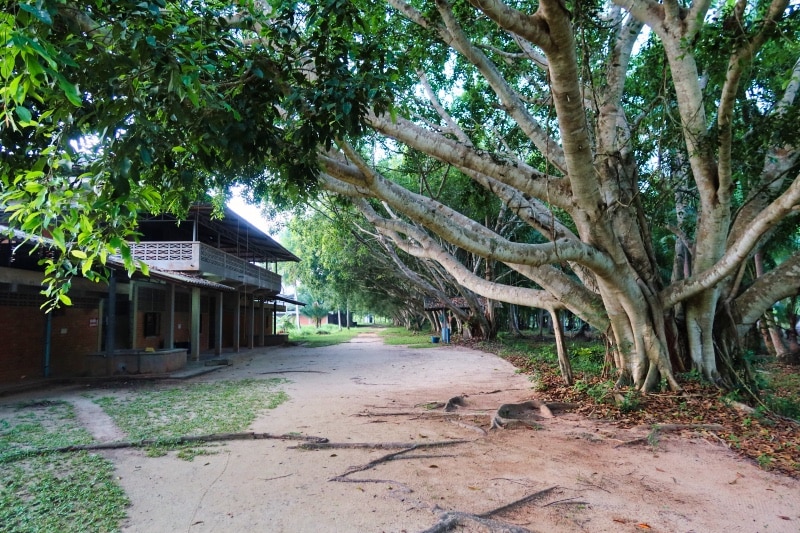
When you arrive at Suan Mokkh, the first thing you do is register. This involves completing some forms and speaking with one of the facilitators or teachers. This allows you to ask questions, bring up any concerns and get an idea of what your next 11 days will be like at Suan Mokkh during your Thailand vipassana retreat.
Then you must surrender your phones and passport and you’re shown to your dorm to get settled in.
Once everyone has arrived and registered, there’s a tour of the grounds and some free time.
Most people use this time to use the hot springs and have a chat. Because it’s your last opportunity to speak for the next week and a half, it’s nice to get to know your fellow participants a little bit and hear their stories.
At 7.15 pm there is a Q&A in the main mediation hall, and then silence begins.
Looking for more offbeat things to do in Thailand? Check out our article on The Best Off the Beaten Track in Thailand
Vipassana in Thailand: What to Expect at Suan Mokkh
Suan Mokkh is set deep in the jungle, so expect there to be insects. A lot of them.
We saw multiple scorpions. Always check your meditation cushion before sitting down!
I returned to my room one night to find a snake slithering through my door handle. Fortunately, I had my headlight on and shined it on the door handle before reaching out.
And worst of all, the mosquitoes are terrible. We think that the caretakers of Suan Mokkh specifically breed them to be super aggressive as an added challenge to the participants (we’re kind of joking). Bring a lot of repellant (especially since you’re not supposed to kill them).
At Suan Mokkh’s 10-day silent retreat in Thailand, you do get free time each day. This is in the morning after breakfast, in the afternoon after lunch and after the evening drink. You can use this to bathe, use the hot springs, do laundry, nap, just sit in your room or go for a walk.
Read: The Ultimate Chiang Dao Travel Guide
What to Wear For A Vipassana Meditation Retreat in Thailand
At some Thailand vipassana meditation retreats, you can only wear white. This is not the case at Suan Mokkh and you are allowed to wear coloured clothing.
You should wear long, loose clothing. The Thailand vipassana meditation retreat is held within temple grounds, so modesty is expected. This means full-length pants and sleeves that cover your shoulders. You are not allowed to wear shorts or tank tops. Also avoid showing your midriff, or wearing anything too tight, or see-through.
It’s also very hot and humid, so you’ll want loose fabrics.
The shop at Suan Mokkh sells fisherman pants if you do not have anything of your own that would be appropriate.
Meditation Retreat Group Sizes
The size of Thailand vipassana groups can vary widely. We had a small group of about 25, but have heard of almost a hundred.
Expect at least 20% of participants to drop out throughout the 10 day silent retreat in Thailand. We’ve had friends attend retreats where up to 75% dropped out.
Accommodation at Your Thailand Vipassana Retreat
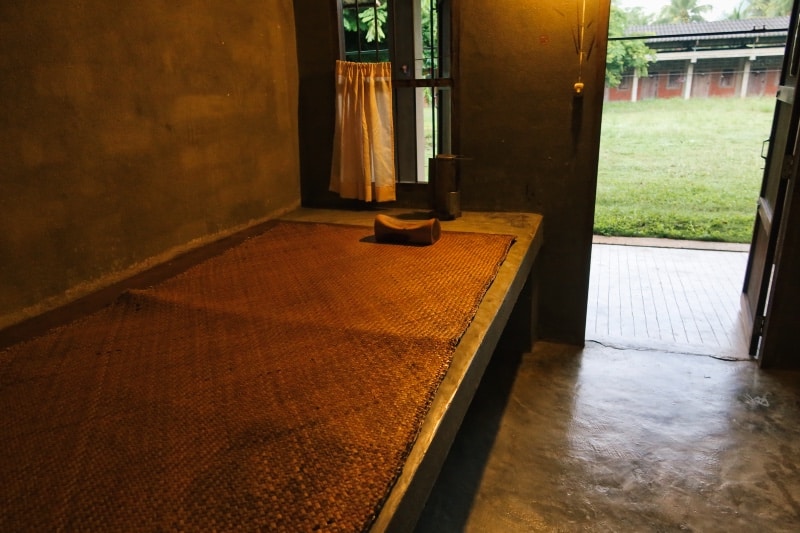
You stay on the Suan Mokkh grounds of the retreat centre for the entire Thailand vipassana silent retreat.
(Side note: I spoke with one participant at the end of the retreat. When I asked her why she attended, she said she had heard good things. Then she said, ‘the way I figure it, best case scenario, I have a life-changing experience. Worst case, I have somewhere cheap to stay for 10 days.’)
There are two dormitories on the Suan Mokkh grounds, segregated by sex. They’re rectangular, with the rooms surrounding an inner courtyard
You get your own, very small, very basic room. Imagine a prison cell. I know, it sounds bleak, but that’s precisely what it’s like. Your bed is a raised, cement platform.
For sleeping, you get a straw mat, a wooden pillow and a light blanket. (We used our own sleeping bag liners). Some people also bring yoga mats to soften the bed, or blow-up pillows (but note that the latter is forbidden so you will have to be sneaky about this).
You are also provided with a mosquito net. This is very important, because of all the creepy crawlies around (see above).
There are communal areas for bathing in the dormitories. This is a large cistern full of water and you wash by bucket. Women wear their sarongs whilst bathing for modesty.
You must also do all of your laundry by hand. Our Scrubba really came in handy here.
Eating at a Vipassana Meditation Retreat in Thailand
At a Thailand Vipassana retreat, you get two vegetarian meals a day. Yep, just two. If it makes you feel better, they’re delicious. Or maybe that was just my hunger speaking.
Breakfast consists of rice porridge and usually some kind of vegetable. There are almost always bananas and water with herbs in it.
Lunch is a varied mix of curries and soups.
Before each meal, you communally recite a mantra about food. This is meant to curb your appetite. Buddhists believe in eating to stay alive and not overindulge. Some stories are easy to tune out while others will ensure you don’t go up for seconds.
Every evening you get a drink – usually tea, but if you’re lucky, once in a while they throw in hot chocolate. If this happens to you, it will make your night.
Daily Routine at a Thailand Vipassana Retreat
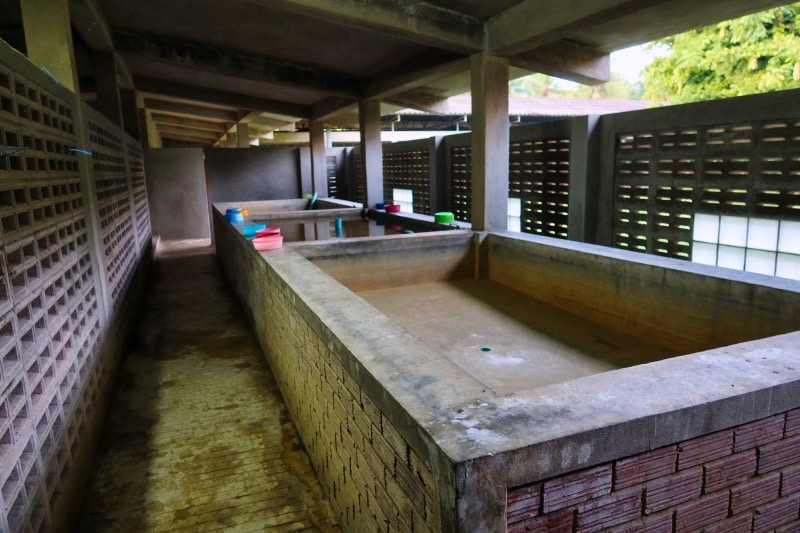
There is a very consistent daily routine, with slight modifications on the last two days.
At your Thailand Vipassana meditation retreat at Suan Mokkh, here is what your day will look like:
4:00 am – Wake up
A large bell goes off, repeatedly, to wake you up bright and early. Don’t worry, you won’t miss it.
4:30 am – Morning reading
4.45 am – Sitting meditation
5.15 am – Yoga
At most Thailand vipassana meditation retreats exercise is not allowed, however, at Suan Mokkh they have a daily yoga practice.
This is guided yoga, but you are also allowed to do your own practice in a separate space.
7.00 am – Dhamma talk and sitting meditation
8.00 am – Breakfast and chores
You have to do a simple chore every day, such as sweeping, gathering leaves, or mopping the dining room floor. These are very simple and only take 15-20 minutes.
10.00 am – Dhamma talk
11.00 am – Walking or standing meditation
11.45 am – Sitting meditation
12.30 pm – Lunch
2.30 pm – Meditation instruction and sitting meditation
3.30 pm – Walking or standing meditation
4.15 pm – Sitting meditation
5.00 pm – Chanting and loving-kindness meditation
6.00 pm – Tea and hot springs
7.30 pm – Sitting meditation
8.00 pm – Group walking meditation
8.30 pm – Sitting meditation
9.00 pm – Bedtime
9.30 pm – Lights out
Spending some time in Thailand’s south? Read our article on 13 Epic Things to Do in Khao Sok National Park + Essential Travel Guide
Getting to Suan Mokkh
Suan Mokkh is located in the south of Thailand, 53 km northeast of Surat Thani.
From Bangkok
From Bangkok′s main train station, take any southbound train and get off at Chaiya.
The price for the train (2nd class sleeper, fan) is about 500 THB if you buy it from the State Railway of Thailand directly. Note that the official website is slow and clunky and has a history of crashing. Your foreign card may also not work on their website, but a Wise card works perfectly!
For more convenience and ease, you can also buy your tickets online from 12Go Asia.
Once you get to Chiaya, take a blue songtaew (a pick-up truck) to Suan Mokkh. The songtaew from Chaiya to Suan Mokkh is about 20 THB.
From the South
From the south, take a train that stops in Surat Thani (Phun Phin) or Chaiya. Again, these can be purchased from the State Railway of Thailand directly, or from 12Go Asia.
At Phun Phin station, ask at the bus stop in front of the station for a Chumpon (no. 474) or Ranong (no. 469) bound bus going by Suan Mokkh. These depart approximately every hour until 3.00 pm and take about 1.5 hours. They should be around 50 THB.
If you’re already in Surat Thani, you can also take a minivan and just tell the conductor that you want to get off at Suan Mokkh (it is well-known).
There are also some buses from Phuket to Bangkok that pass Suan Mokkh. Just make sure to let the conductor know. Ask at the government bus terminal in Phuket.
Once you’re dropped off at the highway, it’s a 1.5 km (20 min walk) to the Retreat Centre.
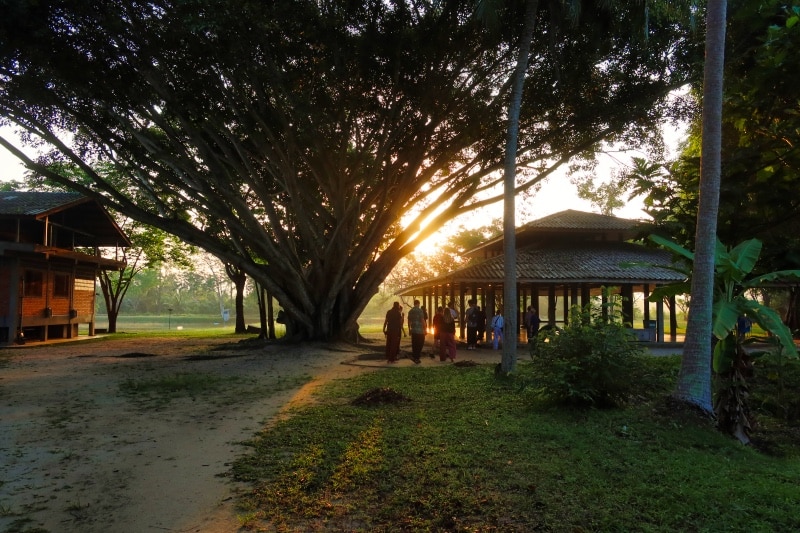
What To Pack For Your Thailand Vipassana Retreat
- Long, loose clothing
- Headlamp
- Sandals that are easy to take on and off – you’ll be slipping in and out of these often
- Towel
- Toiletries such as soap, shampoo and brush
- Toilet paper (none is provided)
- Mosquito repellant
- Water bottle (you can rent one from the centre if you do not have your own)
- If you’re feeling naughty – blow up pillow, sleeping mat and soy milk packages to hide in your room and savour when your hunger is absolutely killing you.
Vipassana Meditation Retreat: The Challenges
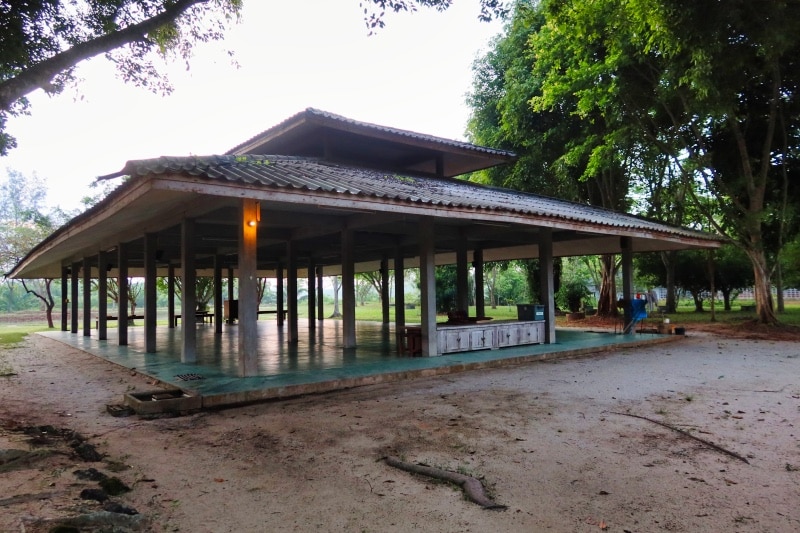
Is it hard?
Hell yeah it is.
For both of us, it was one of the hardest things we’ve ever done. Most people find it extremely difficult, but for different reasons.
It’s important to note that everyone experiences a 10 day silent vipassana retreat in Thailand uniquely, and finds parts challenging for different reasons. We’ll just touch on a few that we felt and that others who have done the same or a different retreat have explained to us.
Dotti
For me, the sleep deprivation was very difficult.
Even though we were going to bed early, I couldn’t sleep well throughout the night and found the 4.00 am wake-up calls arduous. I was probably getting 2 – 3 hours of sleep a night.
After a few days, I ended up taking morning naps during our free time, which really helped.
A lot of people talk about boredom. As we are so used to external stimuli, when you are deprived of it entirely, you can get quite bored. This is something to mentally prepare for. Moreover, time can also move very slowly. For me, each day felt like 48 hours. I remember thinking on day 3 that day 11 felt like an eternity away. At that point, I realised that it was going to be the longest 11 days of my life.
And very specific to Suan Mokkh, the heat and humidity got really intense. The mosquitoes also drove me insane.
Zandy
For me, this was my 3rd vipassana retreat. I found that it doesn’t necessarily get easier with practice and each occasion seems to present a new set of challenges.
On this occasion, the heat and mosquitoes were an absolute killer! Also, this was my first retreat sleeping on the concrete ground, straw mat, and wooden pillow set-up (admittedly, I switched over to my blow-up pillow) and that was a challenging and uncomfortable adjustment.
It was also my first time undergoing a vipassana retreat with a partner. This created the added challenge of worrying about Dotti – is she finding the experience worthwhile? How is she holding up? Is she finding it all too challenging?
Fortunately, I took solace in the fact that Dotti is super tough and ultimately, I knew that she’d persevere.
We also made the decision from the beginning not to interact at all as it could detract from our personal journeys. We would certainly recommend this path to other couples as it helped us focus on ourselves and limited our distractions. We also witnessed other couples not so subtly interacting and it didn’t appear to work as well for them.
Vipassana Meditation Retreat: The Benefits
Was it worth it?
Definitely.
It’s something you’ll rarely, if ever, do again in your life.
Think about it. For 11 days straight, you will:
- Be completely silent;
- Meditate for more than 7 hours a day;
- Barely sleep;
- Be uncomfortable; and
- Have limited food.
How often can you say that you endured all those challenges, and made it through? It’s such an amazing feat and we left with the greatest sense of accomplishment.
Your mind just slows down. We live in a world where everything is happening at full speed, all the time. We multi-task, we’re constantly stimulated and things are always competing for our attention. To live in simplicity, with very little external stimuli, for an extended period of time, is a great feeling.
You feel so whole and as cliche as it may sound, quite peaceful.
If you get deep enough into the meditation, you can reach some pretty crazy levels. For us, some of these experiences were akin to a psychedelic trip.
Other participants we spoke to used it to work through problems or issues they were facing, or just take a break from regular life. There are so many different, and personal reasons that lead one to undertake a Thailand meditation retreat. Whatever yours is, know that it will be beneficial and worthwhile to you.
Other Places To Do A Vipassana Retreat in Thailand
There are many other places in Thailand where you can do a vipassana meditation retreat.
Suan Mokkh has a sister centre: the Dipabhāvan Meditation Center in Koh Samui. They have different options for courses, including an option to do a 3-day course. You also get an evening banana there.
There are also many vipassana retreat centres in Chiang Mai and elsewhere in Thailand. Wat Chom Tong, located outside of Chiang Mai also has an excellent international vipassana program.
Like this post? Pin it for later!
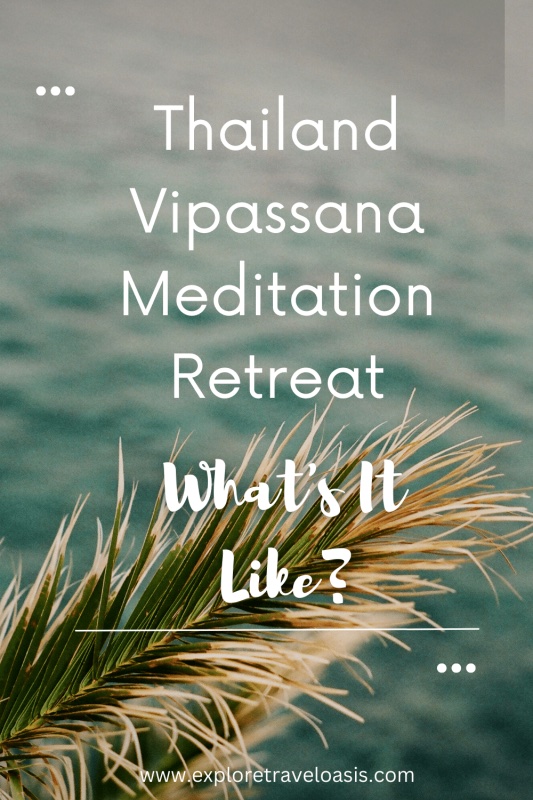
Disclaimer: This post contains affiliate links. This means that if you buy or book anything through them, we’ll earn a small commission at no extra cost to you. This helps us run this website and create comprehensive guides to help you get off the beaten track. We only recommend products and/or services that we use ourselves and trust.

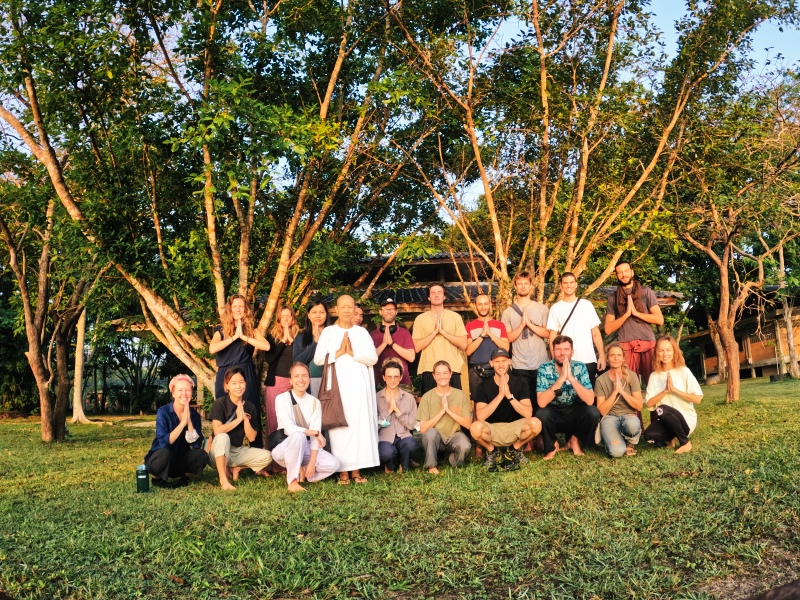
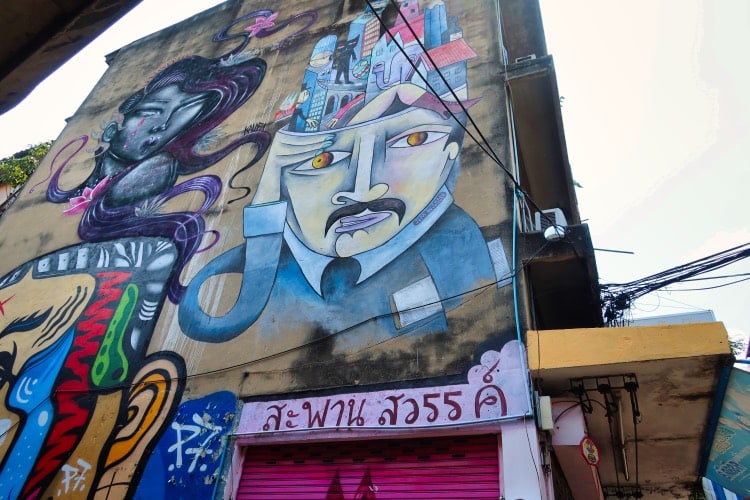
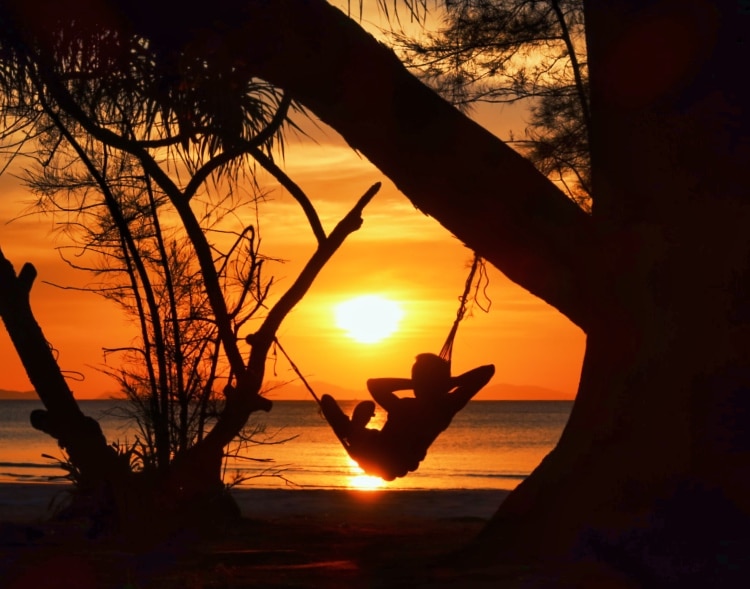
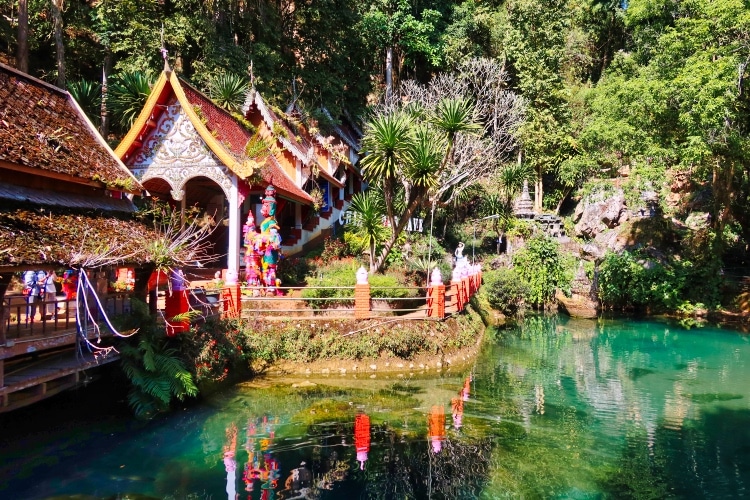
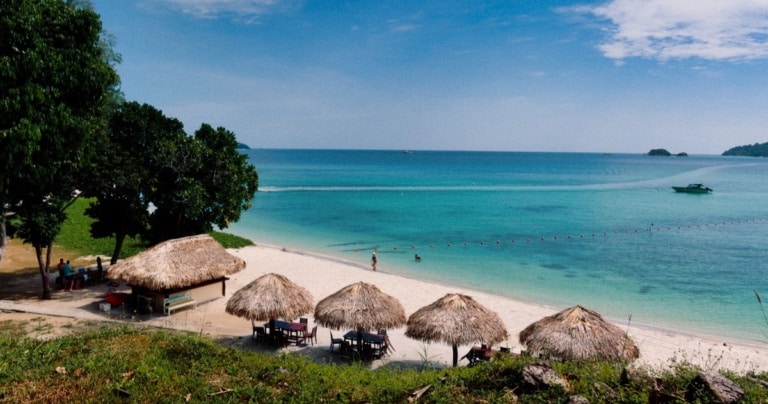
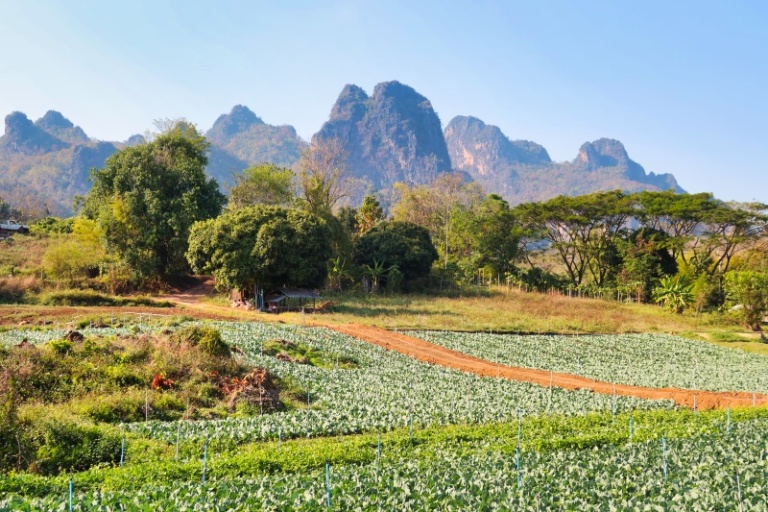
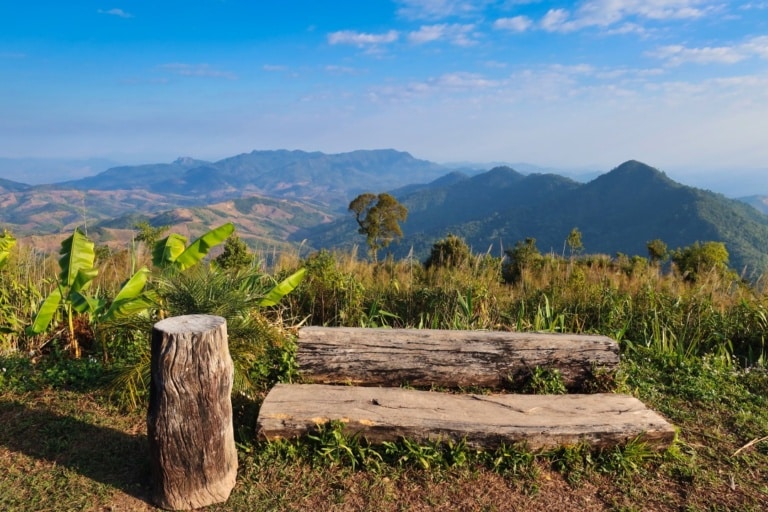
I thought of taking yoga training program in Thailand.
Such a relaxing place, definitely absorbs the vibe.
Thanks for sharing your experiences..
You’re welcome! We’d love to do a formal yoga training course one day. 🙂
Thank you you so much for this useful guide , I am going there today so have been reading your wisdom. Thanks, and your blog very much appreciated.
Hi Patrick, we’re so glad you found it useful. Enjoy your journey!